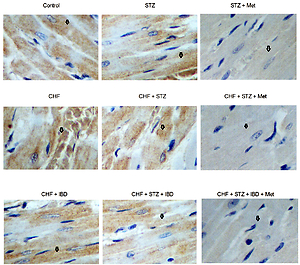Current issue
Archive
Manuscripts accepted
About the Journal
Editorial office
Editorial board
Section Editors
Abstracting and indexing
Subscription
Contact
Ethical standards and procedures
Most read articles
Instructions for authors
Article Processing Charge (APC)
Regulations of paying article processing charge (APC)
DIABETOLOGY / RESEARCH PAPER
Synergistic effects of ivabradine and metformin in the treatment of concomitant chronic heart failure and diabetes mellitus by regulating the activity of the H19/miR-423-5p/HCN4 axis
1
Ultrasound Diagnosis Department II, The first hospital of Qinhuangdao, No.258 Wenhua Road, Haigang District, Qinhuangdao 066000, Hebei Province, China
2
Endocrinology Department I, The first hospital of Qinhuangdao, No.258 Wenhua Road, Haigang District, Qinhuangdao 066000, Hebei Province, China
3
Research Department, The first hospital of Qinhuangdao, No.258 Wenhua Road, Haigang District, Qinhuangdao 066000, Hebei Province, China
Submission date: 2019-05-28
Final revision date: 2019-09-23
Acceptance date: 2019-11-01
Online publication date: 2021-03-26
Corresponding author
Fang Zhang
Ultrasound Diagnosis Department II, The first hospital of Qinhuangdao, No.258 Wenhua Road, Haigang District, Qinhuangdao 066000, Hebei Province, China
Ultrasound Diagnosis Department II, The first hospital of Qinhuangdao, No.258 Wenhua Road, Haigang District, Qinhuangdao 066000, Hebei Province, China
KEYWORDS
TOPICS
ABSTRACT
Introduction:
In this study, the molecular mechanisms underlying the therapeutic effect of metformin (MET) and ivabradine (IBD) in the treatment of concomitant chronic heart failure (CHF) and diabetes mellitus (DM) were investigated.
Material and methods:
Basic and cardiac indexes were measured to study the therapeutic effect of MET and IBD. Real-time PCR, IHC assays, in-silicon analysis, luciferase assays, real-time PCR and Western blot assays were conducted to clarify the molecular mechanisms underlying the interaction between MET and IBD.
Results:
MET administration restored the normal values of general/cardiac indexes in CHF rats. The abnormal values of echocardiographic indexes in CHF rats with STZ-induced DM were all corrected by a certain degree after the MET administration. Moreover, the injection of STZ up-regulated the expression of plasma NE/BNP-45, while the IBD administration reduced the levels of NE/BNP-45 in CHF rats. Furthermore, the administration of MET also reduced the NE level in CHF rats, indicating that both MET and IBD can exert a therapeutic effect on CHF rats. Additionally, in-silicon analysis and luciferase assays verified the role of H19 and HCN4 as target genes of miR-423-5p. In fact, the transfection of MET or H19 siRNA1/2 into HL-1 and H9C2 cells down-regulated the levels of H19 and HCN4 while increasing the level of miR-423-5p.
Conclusions:
MET reduces H19 expression via inducing methylation of its promoter, and the inhibited H19 expression suppresses HCN4 expression by up-regulating miR-423-5p expression. As a result, the suppressed expression of HCN4 reduces heart rate and exhibits a therapeutic effect in the treatment of concomitant CHF and DM.
In this study, the molecular mechanisms underlying the therapeutic effect of metformin (MET) and ivabradine (IBD) in the treatment of concomitant chronic heart failure (CHF) and diabetes mellitus (DM) were investigated.
Material and methods:
Basic and cardiac indexes were measured to study the therapeutic effect of MET and IBD. Real-time PCR, IHC assays, in-silicon analysis, luciferase assays, real-time PCR and Western blot assays were conducted to clarify the molecular mechanisms underlying the interaction between MET and IBD.
Results:
MET administration restored the normal values of general/cardiac indexes in CHF rats. The abnormal values of echocardiographic indexes in CHF rats with STZ-induced DM were all corrected by a certain degree after the MET administration. Moreover, the injection of STZ up-regulated the expression of plasma NE/BNP-45, while the IBD administration reduced the levels of NE/BNP-45 in CHF rats. Furthermore, the administration of MET also reduced the NE level in CHF rats, indicating that both MET and IBD can exert a therapeutic effect on CHF rats. Additionally, in-silicon analysis and luciferase assays verified the role of H19 and HCN4 as target genes of miR-423-5p. In fact, the transfection of MET or H19 siRNA1/2 into HL-1 and H9C2 cells down-regulated the levels of H19 and HCN4 while increasing the level of miR-423-5p.
Conclusions:
MET reduces H19 expression via inducing methylation of its promoter, and the inhibited H19 expression suppresses HCN4 expression by up-regulating miR-423-5p expression. As a result, the suppressed expression of HCN4 reduces heart rate and exhibits a therapeutic effect in the treatment of concomitant CHF and DM.
Share
RELATED ARTICLE
We process personal data collected when visiting the website. The function of obtaining information about users and their behavior is carried out by voluntarily entered information in forms and saving cookies in end devices. Data, including cookies, are used to provide services, improve the user experience and to analyze the traffic in accordance with the Privacy policy. Data are also collected and processed by Google Analytics tool (more).
You can change cookies settings in your browser. Restricted use of cookies in the browser configuration may affect some functionalities of the website.
You can change cookies settings in your browser. Restricted use of cookies in the browser configuration may affect some functionalities of the website.



